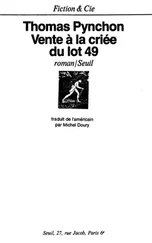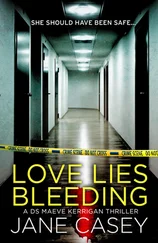Maxine begins to prowl the apartment. The boys stacked in bunk beds, the door left a little open, she likes to think for her, knowing that someday their doors will be shut and she’ll have to knock. Ernie’s office, which he shares with a washer and dryer, an antique Apple CRT monitor on a desk, left on, Elaine’s dining-room museum of long-operating lightbulbs from this apartment, each in its little foam display holder, labeled with the dates of screw-in and burnout. Sylvania bulbs of a certain era seem to’ve lasted the longest.
Some kind of classical music coming from the TV room. Mozart. In these desperate stretches of early-morning programming, she finds Ernie tubeside, his face transfigured in the ancient Trinitron glow, watching an obscure, in fact never-distributed Marx Brothers version of Don Giovanni , with Groucho in the title role. She tiptoes in barefoot and sits next to her father on the couch. There’s a big plastic bowl of popcorn, too big even for two people, which Ernie after a while nudges in her direction. During a recitative he fills her in. “They cut the Commendatore so there’s no Donna Anna, no Don Ottavio, this way, without the murder, it’s a comedy.” Leporello is being played by both Chico and Harpo, one for lines and one for sight gags, Chico fast-talking his way through the Catalogue Aria for example while Harpo runs around after Donna Elvira (Margaret Dumont, in the role she was born for), pinching, groping, and honking his bicycle horn, as well as later picking harp accompaniment for “Deh, vieni alla finestra.” Masetto is a studio baritone who is not Nelson Eddy, Zerlina is a very young, lip-synced and more-than-presentable Beatrice Pearson, later to portray another ingenue with a fatality for scoundrels opposite John Garfield in Force of Evil (1948).
When the opera’s over, Ernie hits the mute button and spreads his hands along with a half shrug, like a basso taking a bow. “So? First time I ever saw you sit through an opera.”
“Don’t know, Pop, must be the company.”
“I taped it for the boys too, seems like it’s up their alley.”
“Cultural exchange, I notice they’ve got you playing Metal Gear Solid these days.”
“Better than the TV garbage I used to find you and Brooke staring at.”
“Yeah, you really hated all those cop shows. If you caught us watching one, you’d turn it off and ground us.”
“It’s like they’ve gotten any better? What happened to private eyes, lovable criminals? lost in all that post-sixties propaganda, Orwell’s boot on the face, endless prosecution and enforcement, cop cop cop. Why shouldn’t we want to keep you girls away from that, protect your sensitive minds? See how much good it did. Your sister the Likudnik, you chasing down poor schmucks who’re only trying to pay the rent.”
“Maybe TV back then was brainwashing, but it could never happen today. Nobody’s in control of the Internet.”
“You serious? Believe that while you still can, Sunshine. You know where it all comes from, this online paradise of yours? It started back during the Cold War, when the think tanks were full of geniuses plotting nuclear scenarios. Attaché cases and horn-rims, every appearance of scholarly sanity, going in to work every day to imagine all the ways the world was going to end. Your Internet, back then the Defense Department called it DARPAnet, the real original purpose was to assure survival of U.S. command and control after a nuclear exchange with the Soviets.”
“What.”
“Sure, the idea was to set up enough nodes so no matter what got knocked out, they could always reassemble some kind of network by connecting up what was left.”
Here in the capital of insomnia, it is hours yet from dawn, and this is what innocent father-daughter conversations can drift into. Beneath these windows they can hear the lawless soundscape of the midnight street, breakage, screaming, vehicle exhaust, New York laughter, too loud, too trivial, brakes applied too late before some gut-wrenching thud. When Maxine was little, she thought of this nightly uproar as trouble too far away to matter, like sirens. Now it’s always too close, part of the deal.
“Were you ever in on that Cold War stuff, Pop?”
“For me? Too technical. But people at Bronx Science I ran with… Crazy Yale Jacobian, nice kid, we used to go downtown, make a little change playing Ping-Pong. He went off to MIT, got a job with the RAND Corporation, moved to California, We lost touch.”
“Maybe he didn’t work in the blowing–up-the-world department.”
“I know, I’m a judgmental person, sue me. You had to been there, kid. Everybody thinks now the Eisenhower years were so quaint and cute and boring, but all that had a price, just underneath was the pure terror. Midnight forever. If you stopped even for a minute to think, there it was and you could fall into it so easily. Some fell. Some went nuts, some even took their own lives.”
“Pop.”
“Yep, and your Internet was their invention, this magical convenience that creeps now like a smell through the smallest details of our lives, the shopping, the housework, the homework, the taxes, absorbing our energy, eating up our precious time. And there’s no innocence. Anywhere. Never was. It was conceived in sin, the worst possible. As it kept growing, it never stopped carrying in its heart a bitter-cold death wish for the planet, and don’t think anything has changed, kid.”
Maxine goes sorting among semiexploded kernels for what little popcorn is left. “But history goes on, as you always like to remind us. The Cold War ended, right? the Internet kept evolving, away from military, into civilian—nowadays it’s chat rooms, the World Wide Web, shopping online, the worst you can say is it’s maybe getting a little commercialized. And look how it’s empowering all these billions of people, the promise, the freedom.”
Ernie begins channel-surfing, as if in annoyance. “Call it freedom, it’s based on control. Everybody connected together, impossible anybody should get lost, ever again. Take the next step, connect it to these cell phones, you’ve got a total Web of surveillance, inescapable. You remember the comics in the Daily News ? Dick Tracy’s wrist radio? it’ll be everywhere, the rubes’ll all be begging to wear one, handcuffs of the future. Terrific. What they dream about at the Pentagon, worldwide martial law.”
“So this is where I get my paranoia from.”
“Ask your kids. Look at Metal Gear Solid—who do the terrorists kidnap? Who’s Snake trying to rescue? The head of DARPA. Think about that, huh?”
“Pop.”
“Don’t believe us, ask your friends in the FBI, you know, those kind policemen with their NCIC database? Fifty, a hundred million files? They’ll confirm, I’m sure.”
She understands this for the opening it apparently is. “Listen, Pop. I have to tell you…” Out it comes. The unrelenting vacuum of Windust’s departure. Edited for grandparental anxieties, natch, like no mention of Ziggy’s krav maga episode.
Ernie hears her through, “Saw something in the paper. Mysterious death, they described him as a think-tank pundit.”
“They would. Hit man, they say anything about that? Assassin?”
“Nope. But I guess FBI, CIA, that wouldn’t rule out assassin.”
“Pop, the petty-fraud community I get to work with, we have our own losers’ code, like loyalty, respect, don’t snitch till you have to. But that gang, they’re out shopping each other before breakfast, Windust was living on borrowed time.”
“You think he was done in by his own? I would’ve guessed revenge, all the seriously pissed-off Third Worlders this guy must have collected along the way.”
“You saw him before I did, you passed me his card, you could’ve said something.”
Читать дальше












